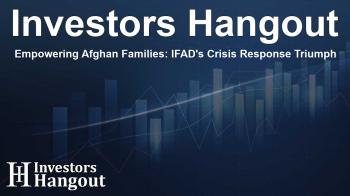Empowering Afghan Families: IFAD's Crisis Response Triumph

Empowering Communities Through Sustainable Practices
The Crisis Response Initiative (CRI) established by the UN's International Fund for Agricultural Development (IFAD) is making significant strides in improving food security for over 175,000 vulnerable rural families in Afghanistan. This initiative is crucial in addressing the various challenges posed by ongoing conflicts, natural disasters, and the economic fallout from global issues, including the COVID-19 pandemic.
A Lifeline for Rural Families
With a staggering 73 percent of Afghanistan's population relying on agriculture and livestock for their livelihoods, the need for immediate and sustainable support has never been greater. The CRI, in partnership with local organizations such as the Dutch Committee for Afghanistan (DCA), has been pivotal in delivering essential aid and resources to those in dire need. This includes training, equipment, and technical assistance aimed at helping families create more sustainable and resilient livelihoods amidst ongoing adversity.
Innovative Approaches to Livestock Management
Investments in animal health and welfare are critical for families dependent on livestock. The CRI has established a comprehensive network of veterinary field units that work to enhance animal health services, thus reducing livestock losses and bolstering household resilience. These initiatives not only offer immediate relief but also set the foundation for long-term recovery and stability.
Market Linkages and Economic Empowerment
One of the remarkable aspects of the CRI is its commitment to fostering economic growth through market linkages for herders. By establishing over 100 sales points and providing training in fair pricing and access to essential resources, the initiative plays a vital role in empowering families to achieve financial independence. Furthermore, climate-friendly livestock breeding practices, including training para-veterinarians in artificial insemination, align with global sustainability goals, showcasing the initiative's forward-thinking approach.
Measuring Impact and Success
A recent assessment revealed the initiative's substantial impact, with 96 percent of participating households reporting increased incomes. This statistic underscores the efficacy of the CRI in not only addressing immediate food security challenges but also in promoting long-term economic resilience among Afghan families.
Community Engagement and Trust Building
At the heart of the CRI’s success lies a community-driven approach. By actively engaging with community development councils, local elders, and customary leaders, the CRI has built a strong foundation of trust and collaboration. This participatory model ensures that projects are tailored to the specific needs and contexts of communities, fostering ownership and increased adaptation.
Conclusion: A Path Towards Resilience
As IFAD and DCA continue their commendable efforts through the Crisis Response Initiative, the focus remains on empowering rural families in Afghanistan. By enhancing food security, improving economic conditions, and fostering sustainable practices, the CRI is not just offering temporary relief but is laying down pathways for a more resilient future.
Frequently Asked Questions
What is the Crisis Response Initiative (CRI)?
The CRI is a program established by IFAD to support rural communities facing various emergencies and challenges, particularly in Afghanistan.
How many families have benefited from the CRI?
Over 175,000 rural Afghan families have received support through the CRI, enhancing their food security and livelihoods.
What types of support does the CRI provide?
The initiative offers training, equipment, technical assistance, and establishes market linkages for herders to improve their livelihoods.
How has the CRI impacted household incomes in Afghanistan?
A rapid assessment revealed that 96 percent of households participating in the CRI reported higher incomes.
Why is community engagement important for the CRI?
Engaging with local leaders and communities ensures that projects are relevant, fosters trust, and encourages local ownership and adaptation to changing needs.
About Investors Hangout
Investors Hangout is a leading online stock forum for financial discussion and learning, offering a wide range of free tools and resources. It draws in traders of all levels, who exchange market knowledge, investigate trading tactics, and keep an eye on industry developments in real time. Featuring financial articles, stock message boards, quotes, charts, company profiles, and live news updates. Through cooperative learning and a wealth of informational resources, it helps users from novices creating their first portfolios to experts honing their techniques. Join Investors Hangout today: https://investorshangout.com/
Disclaimer: The content of this article is solely for general informational purposes only; it does not represent legal, financial, or investment advice. Investors Hangout does not offer financial advice; the author is not a licensed financial advisor. Consult a qualified advisor before making any financial or investment decisions based on this article. The author's interpretation of publicly available data shapes the opinions presented here; as a result, they should not be taken as advice to purchase, sell, or hold any securities mentioned or any other investments. The author does not guarantee the accuracy, completeness, or timeliness of any material, providing it "as is." Information and market conditions may change; past performance is not indicative of future outcomes. If any of the material offered here is inaccurate, please contact us for corrections.
